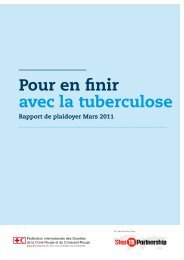Thailand - Stop TB Partnership
Thailand - Stop TB Partnership
Thailand - Stop TB Partnership
Create successful ePaper yourself
Turn your PDF publications into a flip-book with our unique Google optimized e-Paper software.
World <strong>TB</strong> Day<br />
[World <strong>TB</strong> Day is like] a flash of the camera, and then it’s gone.<br />
—Somsak Akksilp, director, Office of Disease Prevention and Control 36<br />
Most government-sponsored <strong>TB</strong> awareness-raising activities are centered on World <strong>TB</strong><br />
Day. Past World <strong>TB</strong> Day activities have included public statements by high-ranking MoPH<br />
officials, 37 MoPH-sponsored television programs about <strong>TB</strong>, road shows, and exhibitions. On<br />
occasion public hospitals have offered services such as free testing, counseling, and basic<br />
medical check-ups for a full week around World <strong>TB</strong> Day. However, Thai <strong>TB</strong> experts generally<br />
agree that more sustained attention to <strong>TB</strong> awareness-raising activities is needed. 38<br />
Media coverage<br />
In comparison to the breadth and effectiveness of AIDS-awareness media campaigns, NTPsponsored<br />
activities to promote awareness of <strong>TB</strong> and <strong>TB</strong>/HIV have been limited in scope.<br />
One national-level <strong>TB</strong> Cluster official commented that the lack of media outreach is a “serious<br />
limitation” of the NTP, 39 while regional health officials point to reductions in the budget<br />
for public awareness-raising activities in the wake of the health sector reforms. 40<br />
Many journalists, unconvinced that <strong>TB</strong> is an important health issue, decline to<br />
cover <strong>TB</strong>-related stories and events. In addition, media personnel often lack the information<br />
and skills to report on <strong>TB</strong> news and policies, 41 particularly given that <strong>TB</strong>-related issues and<br />
research are often presented in highly technical terms. The NTP should produce regular<br />
updated, media-friendly materials on the <strong>TB</strong> situation to encourage and facilitate quality<br />
reporting. The NTP should also cultivate relationships with health journalists, including<br />
by offering training seminars and organizing regular press events to present current issues<br />
such as progress on achieving <strong>TB</strong> control targets, results of latest <strong>TB</strong> research efforts, and<br />
global <strong>TB</strong> developments.<br />
To facilitate these activities, the <strong>TB</strong> Cluster should consider establishing a specialized<br />
media department and hiring trained communications staff to promote NTP policies<br />
and activities as well as disseminate accurate information about <strong>TB</strong> and <strong>TB</strong>/HIV—how <strong>TB</strong> is<br />
spread, prevented, and treated; the risks of <strong>TB</strong> and other opportunistic infections for people<br />
living with HIV/AIDS; and where people can go for diagnosis and treatment. 42 To reach<br />
some of the communities most affected by <strong>TB</strong>, the activities of this department will need to<br />
extend to television, radio, and the Internet as well, 43 and to develop effective partnerships<br />
with regional and local community organizations and media outlets. 44<br />
PUBLIC HEALTH WATCH MONITORING REPORTS 43



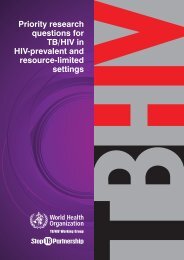
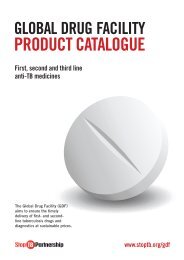
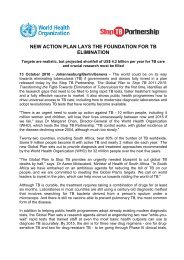
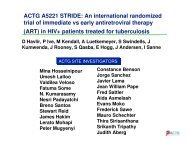
![Global Drug Facility Annual Report 2011 [.pdf] - Stop TB Partnership](https://img.yumpu.com/26788745/1/184x260/global-drug-facility-annual-report-2011-pdf-stop-tb-partnership.jpg?quality=85)

![Concept note on national stop TB partnership [.pdf]](https://img.yumpu.com/26788741/1/184x260/concept-note-on-national-stop-tb-partnership-pdf.jpg?quality=85)
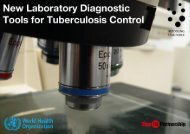
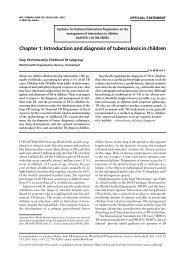
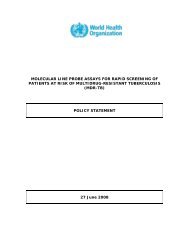
![2005 and Challenges for 2006 - 2015 [.pdf] - Stop TB Partnership](https://img.yumpu.com/26788674/1/190x245/2005-and-challenges-for-2006-2015-pdf-stop-tb-partnership.jpg?quality=85)
![Brochure (French) [.pdf] - Stop TB Partnership](https://img.yumpu.com/17234792/1/190x91/brochure-french-pdf-stop-tb-partnership.jpg?quality=85)

